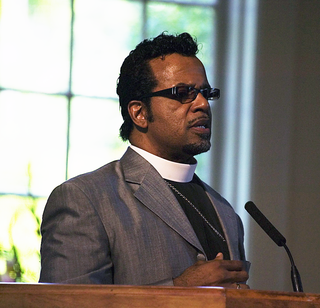A Quote by Roger E. Olson
To some of us, raised and trained in allowing the Bible to absorb the world (that is, to "see" all of reality through the biblical story), the Bible is quite clear about all really important matters.
Related Quotes
We, including many Christians, read the Bible through "eyes" conditioned by, and even accommodated to, modern Western culture plus the influences of messages and ideas from other cultures that are alien to the worldview of the biblical writers. Therefore, in order fully to understand the Bible and allow the Bible to absorb the world (rather than the world - culture - absorb the Bible) we must practice an "archaeology" of the biblical writers' implicit, assumed view of reality.
The Heidelberg Catechism rightly says, for all Christians who allow the Bible to absorb the world for them - who see reality through the biblical story - that the purpose of life is to glorify God - a personal being who is ultimate over us and everything else - and enjoy him forever. This should be clear to all Christians, but many Christians have been influenced to think otherwise even about the Bible because of dabbling in movements such as the New Age Movement or the Gospel of Health and Wealth or even naturalistic humanism.
"Biblical theology" refers to something more precise than theology that is faithful to the Bible. It might be helpful to draw a contrast: at the risk of oversimplification, systematic theology tends to organize theology topically and with an eye cast on its contemporary relevance, while biblical theology tends to organize the same biblical material so that it is easier to see the distinctive contribution of each biblical book and human author, and to trace the trajectories of themes across the Bible so we see how the books of the Bible hold together.
Biblical social scientists have an advantage because they know truths about human nature. Those who dismiss the Bible and create surveys that don't measure crucial factors are the ones who have closed minds. Sometimes the Bible gives us clear answers and sometimes it doesn't, but it always helps us to ask the right questions.
If you can imagine the story of the world as a giant movie, to not have some understanding of the Bible - its story, its history, and its impact - would be like watching a great movie and removing part of the plot. It can't be done. The real truth is that everyone regardless of faith tradition benefits from knowing and understanding these aspects of the Bible. It enhances one's knowledge of literature, science, art etc. It's difficult to read any classic work of literature for instance and not see biblical allusions.
It's important for people in the Church to realize that the way they talk and think about the Bible isn't the way Bible scholars talk and think about it - and I'm including "Bible-believing" scholars there. There is a wide gap between the work of biblical scholars, whose business it is to read the text of the Bible in its own worldview context, and what you hear in church.
The Bible is interpreted by the Talmud. Except, in Rabbinic tradition, a Talmudic law has the weight of the Biblical law. Sometimes we say in a prayer, "Blessed are Thou, O God, who has ordered us and commended us," to do something. But you don't find that "something" in the Bible; you find it in the Talmud. So Talmudic law becomes as important as Biblical law.
When you look at the Bible, and I read the Bible very seriously, for a lot of my life, I believed the Bible ordained the death penalty, and the Bible seemed to be very clear about that. But the more I look, the more troubled I became because it's not that simple. In the Bible, there's some 30 death-worth crimes, like working on the Sabbath, or disrespecting your parents. Are we that fundamental that we should bring back that death penalty?
There is more Bible buying, Bible selling, Bible printing and Bible distributing than ever before in our nation. We see Bibles in every bookstore - Bibles of every size, price and style. There are Bibles in almost every house in the land. But all this time I fear we are in danger of forgetting that to HAVE the Bible is one thing, and to READ it quite another.
I wrote The Jesus Storybook Bible because I wanted children to know the Bible isn't mainly about you and what you're supposed to be doing. It's about God and what he has done. It's the story of how God loves his children and comes to rescue them. It's a Love Story. It's an Adventure Story. And at the center of the story is a baby - the child upon whom everything would depend. And every single story in the Bible whispers his name.
Logically, taking Scripture seriously means being passionately concerned about interpreting it correctly and thus welcoming any evidence that exposes erroneous understandings of the biblical text. Unfortunately, many zealous Bible students and teachers confuse their favorite interpretations of the Bible with the Bible itself.
I started going to Bible school really early in life. Being raised a Jehovah's Witness, I had to read the Bible over and over. These stories were so horrifying and really difficult to reconcile. For me, Noah wasn't the story of the graham cracker box with the little animals it was horrifying. I would ask the same questions as a child. "Well, what about the little kids? What about the dogs and cats?"
The Bible judges the church; the church does not judge the Bible. The Bible is the foundation for and the creator of the church; the church is not the foundation for or creator of the Bible. The church and its hierarchy must be evaluated by the believer with the biblical gospel as the touchstone or plumb line for judging all truth claims.
































